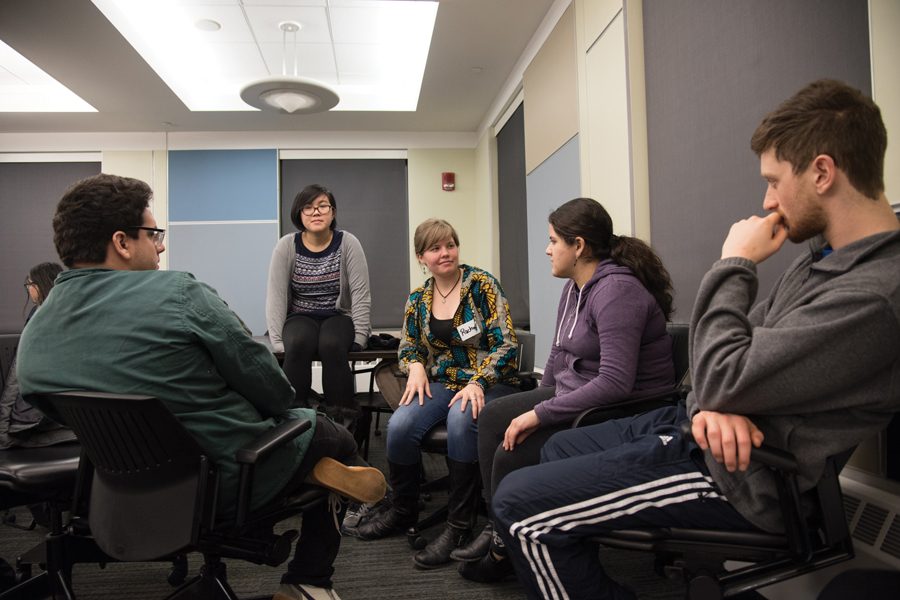Students discuss intersectionality, masculinity at SESP ‘Moonlight’ screening
Allie Goulding/Daily Senior Staffer
Students discuss their thoughts about the themes of “Moonlight” after a screening. The SESP-sponsored event highlighted issues of masculinity and intersectionality.
February 5, 2018
When asked to describe the movie “Moonlight” in a word, students said it was poignant, thoughtful, impactful and beautiful.
More than a year after the movie’s release, about 20 students gathered in Annenberg Hall on Tuesday to watch “Moonlight” and discuss its themes in a community dialogue following the screening. The event was hosted by the School of Education and Social Policy’s Leadership and Programming Board and Diversity Committee.
SESP Prof. Gina Logan, who helped plan the event, said the decision to screen “Moonlight” as part of the quarterly Diversity and Equity Film Series was unanimous among the Leadership and Programming Board members.
Logan, who is on the Diversity Committee, said “Moonlight” focuses on issues that are still relevant today, such as the search for one’s identity.
“One of the major themes was identity — the ‘Who is you?’ question that came up a couple of times,” Logan said. “That’s a literary question and a psychological question that’s timeless.”
After the success of a similar event last year, a screening of the documentary “13th” highlighting issues of mass incarceration, Leadership and Programming Board member Sam Buresch told The Daily the board wanted to grow from that success and find a movie that centered around intersectionality.
The SESP junior added that though it was not the deciding factor, Black History Month played into the decision to screen “Moonlight.”
“If you see what’s happening in the world, who’s being targeted, it’s pretty much the same demographic that has been targeted for the last hundred years,” Buresch said. “With the president … and the ads that are being put out for individuals for running for governor, people are obviously being targeted. Bringing that into discussion was totally necessary.”
A few campus events have centered around the movie, including last year when “Moonlight” director Barry Jenkins spoke on campus last year at a screening and discussion attended by more than 570 students.
“We obviously couldn’t relive that (event), but we wanted to relive it in the sense of bringing to the table those types of ideas and allowing those types of discussions to happen,” Buresch said.
After watching the movie, students broke into smaller groups of about five to seven people to discuss their thoughts and reactions.
Weinberg sophomore Sayeed Sanchez told The Daily even though he had seen the movie before, the discussion after the film helped clarify the identities and arguments depicted in the film.
Sanchez added that the movie shows a side of black men that isn’t typically seen in other movies.
“Even a year later, and farther beyond that, it’s really powerful in that it’s depicting black male vulnerability and really deconstructing black hypermasculinity,” Sanchez said. “Images of black men are typically through music or sports. We don’t always get a lot of images of a soft, tender side of them.”
Email: alliegoulding2020@u.northwestern.edu
Twitter: @alliejennaphoto



